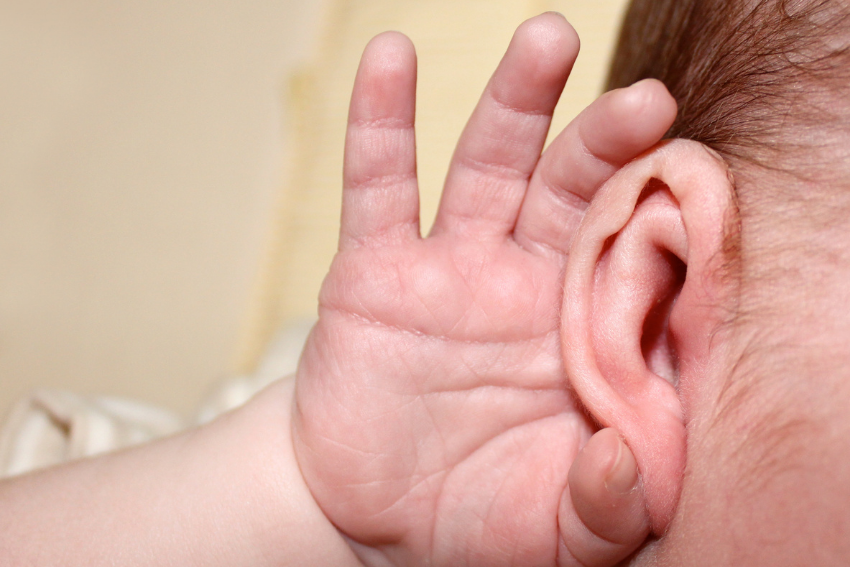Hearing Care for New Born Baby
In India, 5 – 6 infants out of 1000 infants have hearing impairment. Although not life-threatening, hearing impairment can affect the child educationally, socially and economically later in their lives. Because of the lack of visible indicators, hearing impairment may go undetected till your baby is between 18 months and 3 years of age. The possibilities of improved development of language and speech drastically decreases by the time their hearing-related disability is diagnosed. The universal newborn-hearing screening programme promotes the examination of the newborn child for the loss of hearing soon after they are born such that they can be helped with the development of their learning abilities, language and social skills.
Screening of your baby for hearing impairment
Your baby requires to get screened for hearing disabilities within the first six months of life because babies start learning language and speech in this period. Generally, the screening is performed when your child is 4–5 weeks old by a healthcare professional or assistant; however, the screening can be performed till the baby is three months old.
Screening techniques
Specific tests may be performed to exclude hearing-related impairment in your baby if any. Do not worry, these tests are in no way harmful to your baby. Firstly, the automated otoacoustic emission (AOAE) test is performed to exclude hearing loss; this takes not more than a few minutes. In this test, mild clicking sounds are played in your baby’s ears using a small soft-tipped earpiece. However, certain factors may lead to unclear results; if that happens, a second test is performed. The automated auditory brainstem response (AABR) test may be used as the second test where three small sensors are placed on the neck and head of your baby. Mild clicking sounds are played after placing soft headphones over your child’s ears.
The chances of permanent hearing loss are lesser if your baby reacts to the test in both ears. But, babies may develop permanent hearing loss in future; more so in case of hereditary hearing loss, which usually appears after the child has grown up. Head injury, loud noise, ear infection, illness during childhood and intake of some medications are certain other factors that can contribute to the loss of hearing in children. Thus, a routine health check-up of your baby is essential.
Things you can do to develop your child’s language skills
The early initiation of interventions in children with hearing loss has been confirmed to be highly effective in developing the child’s communication skills, which eventually helps the child learn more easily. It is advised that you should frequently communicate with your baby to develop their language and speech. If your baby is detected with hearing loss, you can learn sign languages to strengthen communication with your child. Furthermore, maintain a check on the doctor’s appointments and do not miss them. You may avail the services provided by experts and visit a speech-language pathologist or a teacher for improving your baby’s communication skills.
Devices available for children with hearing impairment
Depending on the severity of hearing loss, devices such as cochlear implants and other hearing aids are available for children. You can consult a paediatric audiologist to know about the advisable device for your baby. Hearing aids are devices that can be worn behind the ear. This device amplifies sounds and makes them clearer. Hearing aids can be worn even by babies who are a month old. However, children who are hard-of-hearing or severely deaf may be suggested to have a cochlear implant, which is surgically placed.
With proper assistance and aid, children with deafness or hearing impairment may become equally good as other children socially, emotionally and academically.
References
- Garg S, Singh R, Khurana D. Infant Hearing Screening in India: Current Status and Way Forward. Int J Prev Med. 2015;6:113. Published 2015 Nov 19. doi:10.4103/2008-7802.170027
- National Screening Unit. Universal Newborn Hearing Screening Programme [Internet] [Updated Nov 21, 2014]. Available at: https://www.nsu.govt.nz/pregnancy-newborn-screening/universal-newborn-hearing-screening-programme . Accessed on May 6, 2021.
- Babyhearing.org. Universal Newborn Hearing Screening [Internet]. Available at: https://www.babyhearing.org/universal-newborn-hearing-screening . Accessed on May 6, 2021.
- National Health Service. Newborn hearing screening [Internet][Updated Mar 22, 2021]. Available at: https://www.nhs.uk/conditions/baby/newborn-screening/hearing-test/ . Accessed on May 6, 2021.
- National Institute of Health. Your baby’s hearing screening [Internet][Updated Aug 13, 2020]. Available at: https://www.nidcd.nih.gov/health/your-babys-hearing-screening . Accessed on May 6, 2021.

